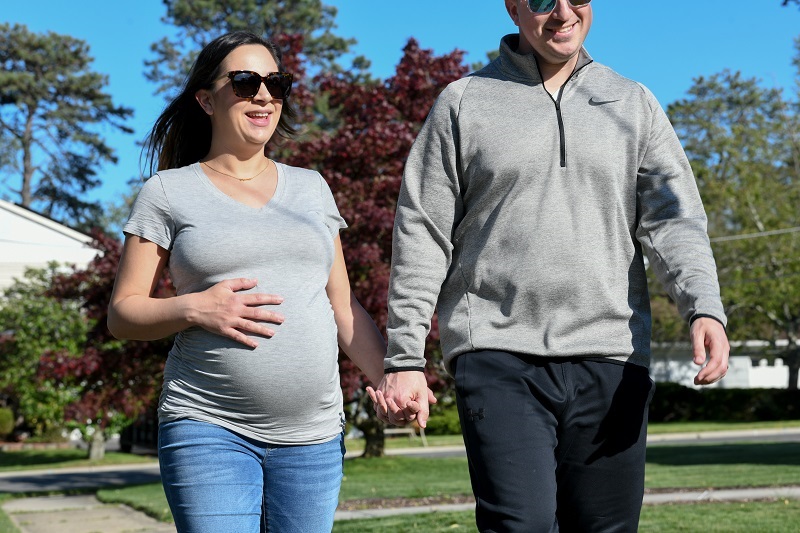How to Exercise Safely While Pregnant

August 11, 2023
Rihanna’s halftime performance earlier this year caused a stir but not because of a wardrobe malfunction but because she was pregnant. After her performance, internet searches regarding exercise and pregnancy skyrocketed.
But should people exercise during pregnancy, and if so, how can it be done safely?
Should You Exercise While Pregnant?
“There are many misconceptions about exercising while pregnant. Many years ago, people thought that exercise during pregnancy could lead to early labor or negatively impact the baby’s growth,” says Antonia F. Oladipo, M.D., MSCI, FACOG, maternal-fetal medicine doctor at Hackensack University Medical Center.
But studies have shown that exercise isn’t harmful during pregnancy and, in fact, it provides many benefits.
Benefits to Exercise in Pregnancy
Dr. Oladipo says there are three categories of benefits.
- Overall health benefits for pregnant people during and after pregnancy. Regular exercise decreases the risk for gestational diabetes, hypertension and urinary incontinence. It also increases positive mental health and muscle strength.
- Benefits during labor. A workout regimen during pregnancy can strengthen the pelvic floor and reduce the need for C-sections. “It improves and optimizes the birth experience,” Dr. Oladipo says.
- Fetal benefits. The benefits for working out also transfer to the baby. It prevents fetal macrosomia, when a newborn is much larger than an average-sized baby. This condition can not only complicate delivery but also put the baby at risk of future health problems.
Activities to Consider During Pregnancy
“[The American College of Obstetricians and Gynecologists] recommends 150 minutes of moderate to intense exercise per week,” Caitlin Gartley, a first-year medical student at Hackensack Meridian School of Medicine.
Activity options to consider:
- Walking
- Running/jogging
- Swimming
- Modified yoga or Pilates
- Cycling (best done on a stationary bike)
- Kegels (pelvic floor muscle training)
Activities to Avoid During Pregnancy
- Contact sports such as basketball, soccer and boxing
- Skydiving
- Scuba diving
- Hot yoga
- Sports with a high risk of falling such as skiing, horseback riding and off-road cycling
Setting Expectations
“You can do most exercises into and possibly through the third trimester,” Dr. Oladipo says. “But the degree and intensity will change, so it’s important to have reasonable expectations.”
It is likely that you will tire more easily or feel short of breath as the pregnancy progresses. You may have swollen feet or acid reflux, which will make working out difficult. Be kind to yourself.
Exercise is great for you and the baby, but make sure you do it safely. Dr. Oladipo and Caitlin advise:
- Stay hydrated.
- Avoid getting overheated.
- Practice good form.
- Use supportive/protective measures such as a belly band or compression socks.
- Listen to your body, and don’t overwork yourself.
Stop exercising immediately if you experience any of the following:
- Leaking fluid
- Vaginal bleeding
- Contractions
- Other body pain
Next Steps & Resources:
- Meet our sources: Antonia F. Oladipo, M.D., MSCI, FACOG, Caitlin Gartley
- To make an appointment with an obstetrician near you, call 800-822-8905 or visit our website.
The material provided through HealthU is intended to be used as general information only and should not replace the advice of your physician. Always consult your physician for individual care.






